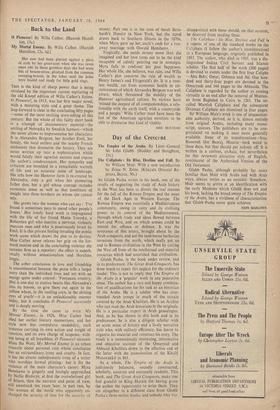Back to the Land
My Mortal Enemy. By Willa Cather. (Hamish Hamilton, 12s. 6d.)
Her ears had been pierced against a piece of cork by her great-aunt when she was seven years old. In those germless days she had worn bits of broom-straw, plucked from the common sweeping-broom, in the lobes until the holes were healed and ready for little gold rings.
THIS is the kind of sharp power that is being revalued by the important current reprinting of the old Knopf edition of Willa Cather's fiction.
Pioneers!, in 1913, was her first major novel, with a maturing style and a great theme. The leap forward is clear in the concluding fifty pages —some of the most exciting story-telling of this century. But the whole of this fairly short book is a triumph of documentary material—the settling of Nebraska by Swedish farmers—which she never allows to impersonalise her characters. It is Alexandra Bergson, her brother Emil, her family, the local settlers and the nearby French settlement that dramatise the history. They are never written up into a sophistication which would falsify their agrarian natures and expose the author's condescension. Her sympathy and criticism are moulded in a remarkable warmth of life and an accurate sense of landscape. She tells how the Hanover farm is re-created by Alexandra, only a girl when her pioneering father dies, but a girl whose courage includes economic sense as well as that loneliness of insight into three brothers on whom she cannot rely.
She groWs into the woman who can say: `I've found it sometimes pays to mend other people's fences.' Her lonely hard work is impregnated with the life of her friend Marie Tovesky, a Bohemian girl who marries a nervous, violently insecure man and who is passionately loved by Emil. It is this private feeling invading the public work scene which draws the plot to its destiny. Miss Cather never relaxes her grip on the for- ward motion and in the concluding violence she remains firm as a reporter : the effect is superb, totally without sensationalism • and therefore tragic.
The sober conclusion in love and friendship is unsentimental because the prose tells a larger story than the individual lives and yet with an energy quite under control: `Fortunate country, that is one day to receive hearts like Alexandra's into its bosom, to give them out again in the yellow wheat, in the rustling corn, in the shining eyes of youth'—it is an unfashionable manner today, but it concludes 0 Pioneers! accurately and is deeply moving.
By the time she came to write My Mortal Enemy, in 1926, Miss Cather had shed her earlier literary mannerisms, and her style now has compulsive readability, each sentence carrying its own action and weight of emotion, and its own charge of suspense, with- out being at all breathless. 0 Pioneers! memori- alises the West; My Mortal Enemy is an urban nouvelle about personal ruin whose conclusion has an extraordinary irony and cruelty. In fact, it has the almost melodramatic irony of a writer who worships formal plotting: but it fits the violence of the main character's career. Myra Henshawe is gingerly and lovingly approached by Nellie Birdseye, at first the overwhelmed girl of fifteen, then the narrator and point of view, still awestruck ten years later, in part two, by this woman of the world who apparently ex- changed the security of love for the security of money. Part one is in the time of Sarah Bern- hardt's Hamlet in New York, but the novel draws back to Southern Illinois in the 1870s, when Myra gave up her uncle's cash for a run- away marriage with Oswald Henshawe.
Tragically, she needs money more than she imagined and her love turns out to be the kind incapable of calmly petering out in nostalgia. Myra fails to confront her past happiness. Her whole life, she believes, was ruin, and Willa Cather's plot concerns the ruin of wealth as Henry James's and Fitzgerald's do. It is a root- less wealth, cut from economic health in cir- cumstances of which Alexandra Bergson was well aware, which threatened the stability of the Hanover agricultural culture. Its victims have `missed the deepest of all companionships, a rela- tionship with the earth itself, with a countryside and a people.' VVilla Cather must have been the last of the American agrarian novelists to be able to dramatise that kind of vitality.
ERIC MOTTRAM


































 Previous page
Previous page